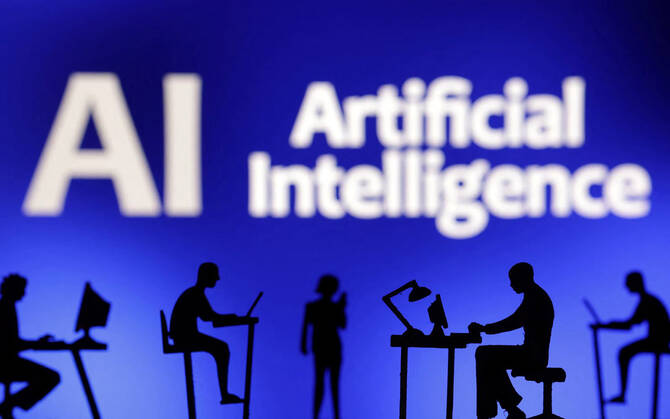RIYADH: As Saudi Arabia forges ahead with its Vision 2030 initiative, artificial intelligence is becoming a cornerstone of its education reform.
Across the Kingdom, AI technologies are reshaping classrooms — personalizing learning, streamlining administration and helping students of all abilities engage with their studies in new ways.

“AI technology has significantly changed the way many students, including myself, approach studying and managing coursework,” Abdullah Mohammed, a law student at Imam Mohammad ibn Saud Islamic University, told Arab News.
“Tools like AI tutoring systems and study apps have made learning more efficient, personalized and accessible.”
While Mohammed said AI tools have enhanced his learning experience, he also acknowledged the need for caution.
“Some AI tools provide quick solutions without much depth, so if I’m not careful, I might miss the critical thinking part of the learning process,” he said.

Tools like AI tutoring systems and study apps have made learning more efficient, personalized and accessible, observers Saudi law student Abdullah Mohammed,. (Reuters photo)
Ultimately, however, Mohammed said he is confident AI has better prepared him for the job market.
The strategic alignment between AI and Vision 2030 is clear, according to Abdulrahman Al-Motrif, professor of information technology and educational computing at King Saud University.
“AI supports the goals of Vision 2030 by enabling personalized learning, optimizing resource management and facilitating access to quality education regardless of geographic location,” he told Arab News.
“AI systems can analyze student performance in real-time, allowing educators to tailor instruction to individual learning needs, thereby enhancing student outcomes and supporting the Kingdom’s ambition to cultivate a future-ready workforce.”
Al-Motrif also highlighted AI’s role in promoting inclusive education.
Opinion
This section contains relevant reference points, placed in (Opinion field)
“AI reinforces Vision 2030’s emphasis on equity, accessibility, and lifelong learning by reaching remote communities and students with special needs,” he said.
This demonstrates AI’s impact not just as a technological innovation, but also as a powerful force for social transformation.
Leading platforms like Alef Education and Classera are already putting this vision into practice. Using real-time analytics, they adapt content to each student’s learning style, proficiency and pace.

Classera platform offers a gamified Learning Management System (LMS) app called C-Kids for kindergarten to Grade 3 pupils. (Classer illustration image)
A study by Alef Education found that students using AI-enhanced platforms achieved a 25 percent improvement in academic performance over just one semester — strong evidence of AI’s ability to boost outcomes through personalized learning.
Crucially, AI is helping make education more accessible. In Saudi Arabia’s diverse learning landscape, tools such as speech-to-text software, adaptive interfaces and real-time assessments are opening doors for students with disabilities.
At King Saud University, collaborations with AI developers have produced tools for visually impaired students, converting written content into audio and using advanced screen-reading technology.
“AI has transformed the learning environment into a more interactive and engaging space,” said Al-Motrif. “Gamified learning platforms and intelligent tutoring systems provide immediate feedback and customized challenges.”

These innovations not only enhance academic performance, but also spark motivation and sustained engagement among learners.
AI is also streamlining back-end operations. Platforms like Madrasati now use AI to monitor attendance, track engagement and assess academic progress, freeing educators to focus more on teaching and mentoring.
Yet AI is not replacing teachers — it is redefining their roles.
“In AI-supported classrooms, educators serve as facilitators, mentors and human connectors in an increasingly digital ecosystem, using AI-generated insights to identify learning gaps,” said Al-Motrif.

A book issued by UNESCO cited the success of “Madrasati” as a globally innovative and distinguished educational model during the Covid-19 pandemic. (Madrasati illustration image)
Still, challenges remain. One significant obstacle is the shortage of Arabic-language content online — making up only 1.2 percent of global digital resources — which limits the effectiveness of AI systems trained on data-rich environments.
To fully realize AI’s benefits, Saudi Arabia must invest in digitizing traditional materials, promoting Arabic content creation and partnering with AI firms to develop language-specific algorithms.
Some institutions are already leading the way. Imam Abdulrahman bin Faisal University and King Abdulaziz University have adopted AI-powered systems to personalize instruction and track student performance, leading to higher satisfaction and retention rates.
These successes show that AI is not merely a technological upgrade — it is a catalyst for reimagining education.

Photo: Pexel/Pavel Danilyuk
By leveraging AI thoughtfully, Saudi Arabia has a unique opportunity to deliver high-quality, personalized and inclusive education while advancing its Vision 2030 goals.
But achieving this future will require more than just technology. It will demand investment, collaboration and a commitment to ensuring that innovation, pedagogy and policy move forward together.
With sustained effort, AI could become the foundation of a dynamic, future-ready education system — one that prepares all learners for the opportunities of the digital age.


















